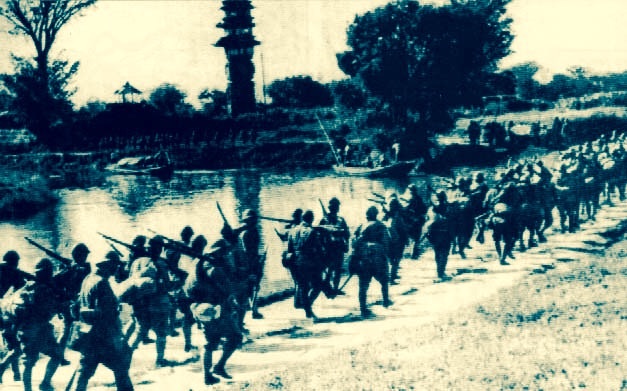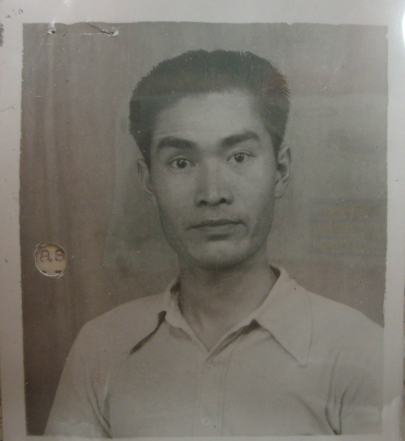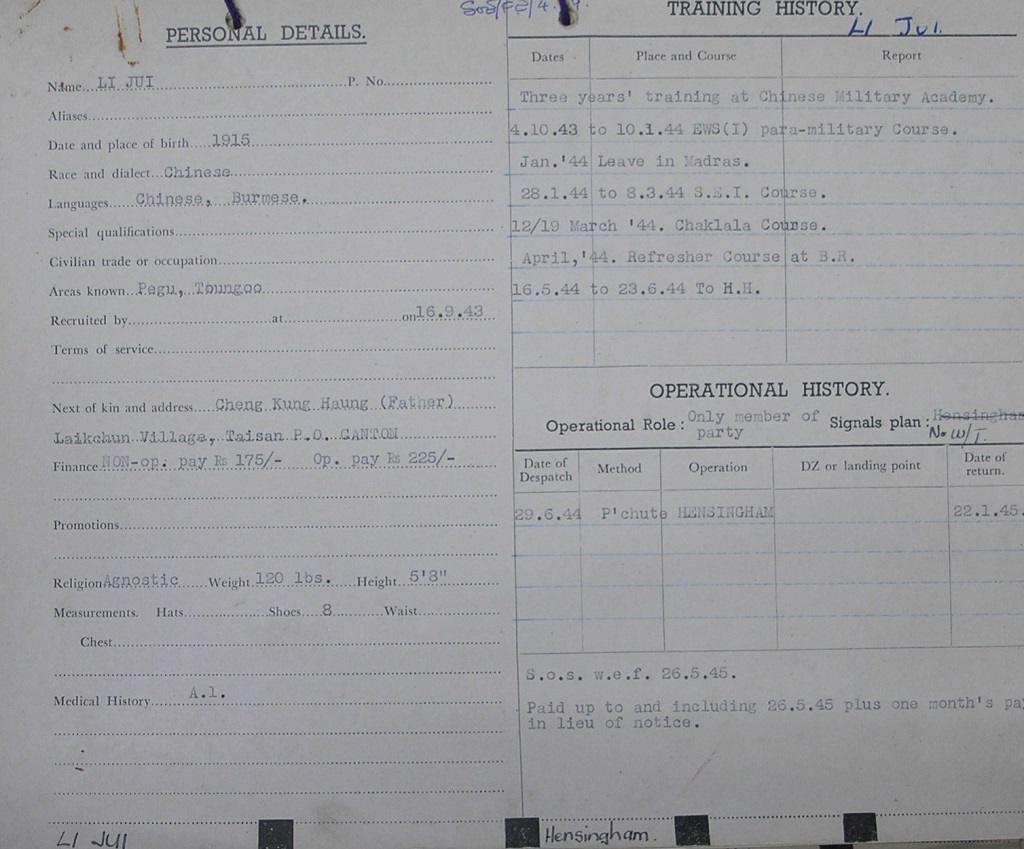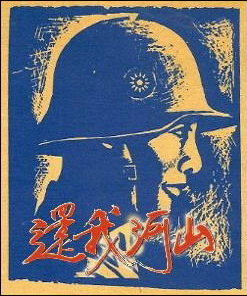A Chinese Agent in Burma
- By Guest blogger
- 13 July, 2017
- No Comments

The article, featuring the extraordinary story of Chinese agent Li Jui, was written by Richard Duckett, a history and international relations scholar at Reading College. It was first published on Dr. Duckett’s blog (click here), and is reproduced with his kind permission. His book Special Operations Executive in Burma will be published by IB Tauris in August 2017.
Li Jui was a Chinese agent who was parachuted into Burma on 29 June 1944. Li Jui’s operation was designated Hensingham and he was tasked with making his way to Mandalay to find out about the possibility of Chinese resistance to the Japanese occupation, to collect intelligence about conditions in the Mandalay area, and to ‘recce a route from MANDALAY to CHINA for the infiltration and exfiltration of agents.’
His operation lasted just short of seven months – and he had quite an adventure. He must have been a man with nerves of steel…
Li Jui was given ‘special stores’ to complete this mission. They consisted of ‘Rs. 1,350 in genuine Jap notes, Burmese notes, silver and jewellry [sic].’ He was also given 2lbs of Chinese opium.
After landing, he made his way to Pinlon village with three Shan traders who he met, one of whom robbed him of Rs. 500 and his opium. After buying ‘ugape, dried fish etc. for trade’, Li Jui travelled by boat down the Shweli River for three days and then proceeded to Mong Mit by road arriving on the 28 July 1944. It was in Mong Mit that he met his first Japanese ‘who were there to keep an eye on the town. He was not questioned by them at all.’
Remarkably, while in Mong Mit, he got Mg Ye – the man who had stolen his money and opium – arrested. He recovered Rs. 650, but had to pay a bribe to the arresting sergeant of Rs. 150. Also in Mong Mit, Li Jui stayed with Ah Han and Ah Li. He told them why he was in Burma and they agreed to help him. On 15 August, Li Jui left Mong Mit with his trade goods and another ally, Ah Pwe, to try and reach Mandalay. He arrived in Mandalay on 5 September, a little over two months after landing behind the lines.
‘Stayed in MANDALAY for about a week trying to work up connections, but owing to the rule of reporting new arrivals at houses was not welcomed.’
While in Mandalay, Li Jui picked up two companions called Ah Hein and Ah King. He left Mandalay with them to go and smuggle opium. On the road to Maymyo there was a lot of Japanese troop movement, mostly at night. He reported that in Maymyo:
‘Jap H.Q. for Upper Burma in Court House. Government House occupied by Jap general. Large number of Jap M.P’s noticable [sic]. Barracks used by Jap troops. Fair amount of cars and trucks on the road, all in Jap hands. Prisoners of War camp in and around Police Station. Railway station in use.’
From Maymyo the triumvirate travelled to Kyaukme, arriving on 22 September. On their third day in town they had just finished dining when ‘some Burman police shouted to them.’ Ah King ran away; Li Jui and Ah Hein were arrested.
Handed over to the Japanese military police, the two men were interrogated on suspicion of being spies sent by the Chinese government:
‘They were questioned, threatened, coaxed etc: for 2 days. On the 3rd day an imposing looking Jap officer took on the interrogation using threats mostly. Even took them outside and and fired a shot from his revolver over their heads, threatening to shoot them on the spot. That evening they were strung up by their hands with only the tips of their toes touching the ground. The 4th day they were tied down onto long chairs in seperate [sic] rooms and forced to drink water. A rubber tube, leading from a kerosene tin of water, was put in the mouth and the nose closed. AH HEIN died while being given the water. After LE JUI had taken as much as he could hold, a soldier jumped on his stomach making him ill. He stuck to his story of being a trader and opium smuggler. He was kept in prison for a week more and fed on rice and salt twice a day. Three Chinese traders AH SHIN SOK, KYAU SOK and LI TEIN signed a guarantee for him and he was released. During his confinement an American officer, a Negro and a Chinese soldier spent a night in the same room as him but he was unable to converse with them. He believes they were sent on to Taunggyi the next day.’
After his release, Li Jui travelled to Lashio, where he arrived on 14 October. Here, he was arrested again and detained for two days despite having been issued with an ID card by his previous captors. Li Jui decided to go back to Mong Mit where he was known so he purchased a viss of opium – he was after all an opium smuggler – and set off, hoping to be able to reach the advancing Allied Army which was reported to be in the Katha area. Along the way he more than doubled his money by selling his opium for Rs. 3000.
In Mong Mit, a Japanese Captain ‘took a fancy to him and gave him a job as interpreter’. He soon became cook and servant too, travelling around with Captain Chem San. While taking a bath in Mabein the town was bombed and he ‘lost all his belongings.’ Throughout December, Li Jui worked for the Japanese, unable to get away, and he was ill for ten days:
‘About this time the villagers suspected him of working for the Allies, as MABEIN was bombed the very day Jap troops entered it. However, one KACKIN TM of KOTHA was also suspected as he moved around the country quite a bit, and was executed by the Japs. After KACKIN TM was executed it made things easier for LI JUI.’
Not long after this, British troops advanced close to Mabein so he attempted to get through the lines, but was shot at. He ran into the hills where he made contact with a British patrol which he led into Mabein. The patrol officer gave him a letter to get him to HQ, and, presumably, this gave Li Jui the right to cadge a lift on a truck with an Indian sergeant – who apparently stole his jewellery.
After reporting to HQ in Kota, Li Jui was taken up twice in light aircraft so that he could point out the Japanese positions he knew about before being flown to Myitkyina, where he arrived on 22 January 1944.
Li Jui, the Chinese agent who, in seven months behind the lines, was robbed twice; imprisoned twice; tortured; employed by the Japanese; almost executed as an Allied spy; bombed; and then nearly shot trying to cross the lines to safety.
A man of great courage and nerve. I wonder what happened to him next…

Li Jui’s training card shows he left SOE end May 1945.



 Copyright © 2025
Copyright © 2025
Leave a Reply